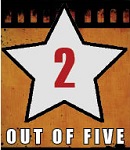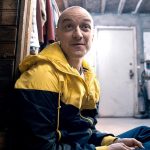

Look, the god's honest truth is I have no idea how you'd properly make a sequel to Unbreakable, M. Night Shyamalan's moody 2000 treatise on superheroes, in the Marvel era. You can't suddenly have a CGI'd Bruce Willis flying around like he's Thor. That would make no sense in the grounded reality of the original film, as well its stealth 2016 horror spinoff, Split. At the same time, you'd need to have some kind of escalation from those other films, re-contextualizing Bruce Willis's everyday superman in an era when heroes dominate the pop-culture landscape.
Or at least you'd think you'd would. But, as it turns out, Shyamalan had no idea how to update Unbreakable either, and its 19-years-in-the-making follow-up is dead on arrival, a plodding, would-be think piece stuffed with lots of philosophizing about the nature of superheroes but far too few examples of people actually being superheroes. The story opens with Unbreakable's David Dunn (Willis) tracking down Split's Horde (James McAvoy) to rescue another group of abducted teenagers. Both are eventually apprehended by police and committed to a psychiatric hospital that also houses Dunn's original nemesis, the brilliant but brittle Mr. Glass (Samuel L. Jackson). That's where they're treated by Dr. Ellie Staple (Sarah Paulson), a psychiatrist who specializes in people who mistakenly believe they have super powers.
And that's pretty much the movie. Staple goes about trying to convince them that they're all deluded. The Horde (real name: Kevin) tries to manage his various personalities. David sits around moping. Mr. Glass (real name: Elijah) seems largely comatose thanks to his meds, but you know he's cooking up some kind of nefarious plan. Doesn't sound particularly exciting, does it? It's not. There are also a trio of non-powered characters invested in the fate of each of the leads: David's son Joseph (a grown-up and returning Spencer Treat Clark), Mr. Glass's mother (Charlayne Woodward) and Anya Taylor-Joy's Casey, the kidnapping victim who made it out alive at the end of Split. None of them are terribly interesting, which becomes a problem as they become more and more important to the story.
Even ignoring the plot, the movie feels out of balance thanks to competing intentions. Thematically, Glass plays out like a direct sequel to Unbreakable, focused as it is on superheroes, comic books and whether such people could exist in the real world. But from a character perspective, this is the James McAvoy show, with the many personalities of his Split character dominating the film. (A few new ones even come out to play this time.) This results in the movie's one real positive: McAvoy is still entertaining as hell, often flipping rapidly through the people that live inside Kevin's head within a single scene.
But shouldn't a true Unbreakable sequel give Willis … you know … something to do? People like to slag on Willis for not giving a shit about his craft anymore — which is largely true — but I don't think it's fair to level that criticism here, as he's honestly not given anything meaty to work with. He sits in a room looking stoic and eventually throws a punch or two and bends a steel bar. That's it. He doesn't really have an arc. And though the movie hints that he's spent the intervening years using his powers for good (the city knows him as a green-hooded hero called "The Overseer"), on screen there's zero evolution from where he was at the end of Unbreakable. In fact, Glass actually partially resets his character by having Staple convince David that he doesn't actually have the powers he thinks he has. Resetting characters instead of allowing them to grow and face new challenges is literally one of the worst things a sequel can do. Night could have at least injected some excitement into a scene where David has to believe in himself and bust through a thick steel door, but unfortunately Glass might be the filmmaker's most stagnantly-directed film.
Shyamalan also wrote Glass, so, yeah, there's a twist. Actually there are two. The first one is fine but largely inconsequential. The second one is dumb as hell. The movie is rife with plot holes and inconsistencies that Shyamalan just hand-waves away. (For starters, I know Elijah is a stone-cold genius, but how in the hell did he become an expert computer programmer over the two decades he's been locked up? The hospital staff wasn't giving him books on coding were they? Or was he sneaking out of his room for five minutes of intense study every single night?)
In my review of Split, I fretted a bit over whether the shocking twist revealing that film as part of the Unbreakable universe might ultimately have a negative effect what was otherwise a pretty good thriller. There's no doubt that's the case now. With The Visit and (most of) Split, Shyamalan seemed on track to reinvent himself as a low-budget schlockmeister. He needs to go back to that track and stay there. Glass is pretty low budget (and, believe me, it feels it), but Shyamalan is once again trying to make some sort of grand, important statement on why we need heroes in the world. Glass fails spectacularly trying to address that question, leaving its characters standing around with all of these special abilities but no interesting ways to use them.











